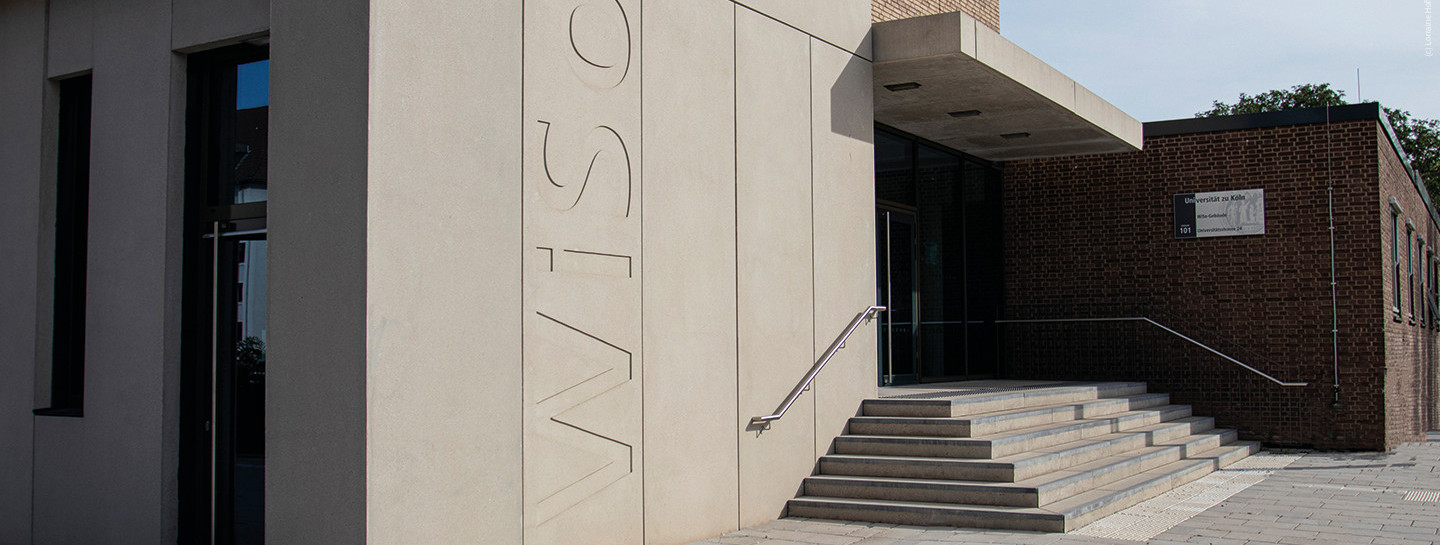Venue
Conference location
The ECSR 2025 Conference will take place on the main campus area of the University of Cologne. The welcome reception, registrations, keynote lectures, and the conference dinner will be held in the Lecture Hall Building (Hörsalgebäude, Universitätsstraße 35), and all regular sessions will be hosted in the neighboring Seminar Building (Seminargebäude, Universitätstraße 37). Nestled within the main university campus area, both are also conveniently located near vibrant social hubs like Zülpicher Straße and Belgisches Viertel, as well as green spaces such as Hiroshima-Nagasaki Park and Stadtgarten, offering ideal spots for relaxation amidst the academic setting.
| Lecture Hall Building |
Seminar Building |
University, Faculty, Institute
The University of Cologne (Universität zu Köln, or UzK), founded in 1388, is one of the oldest and most prestigious universities in Germany, renowned for its academic excellence and research contributions across various disciplines. Located in the vibrant city of Cologne, the university attracts a diverse community of students, scholars, and researchers, fostering a dynamic and intellectually stimulating environment. With a long-standing history and a modern approach to education, UzK has grown to become one of Europe’s largest universities. It offers a broad range of study programs in disciplines such as law, medicine, humanities, natural sciences, and social sciences. Its commitment to research and innovation is reflected in its extensive network of international partnerships and its role in shaping academic and societal discourse.

Among UzK's many faculties, the Faculty of Management, Economics, and Social Sciences (WiSo-Fakultät) stands out as a leader in the fields of business, economics, and social sciences. The faculty was founded in 1901 as a School of Commerce and now has over a century of experience in the education of new generations of business professionals, sociologists and political experts. It is one of the largest and most distinguished faculties of its kind in Europe, offering a wide array of programs that are highly regarded for their academic rigor and practical relevance.

The evolution of sociology at UzK is particularly notable. As a discipline, sociology has a deep-rooted tradition within the university, shaping the understanding of social structures, dynamics, and transformations. Its engagement with sociology dates back to the early 20th century, when it became one of the pioneering institutions in Germany to formally establish sociology as a field of academic study. Today, the Institute of Sociology and Social Psychology (ISS) at UzK continues this tradition, offering cutting-edge research on topics such as social inequality, migration, family structures, and social change. According to this demography and social inequality is one of the key research initiatives which investigates the interplay between these two topics in contemporary societies. The interdisciplinary approach of the WiSo Faculty allows for rich collaboration between sociology and other social sciences, providing students and researchers with a comprehensive understanding of complex societal challenges. The Institute's strong focus on empirical research and quantitative methods ensures that it remains at the forefront of sociological inquiry. ISS stands out for its ability to combine rigorous scientific methods with a deep commitment to societal relevance. Its research not only advances academic understanding but also plays a critical role in shaping policies and social strategies. This makes ISS a leading institution in sociology and social psychology, known for its capacity to generate knowledge that is both intellectually robust and practically applicable.







